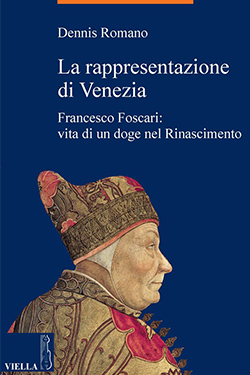La rappresentazione di Venezia Francesco Foscari: vita di un doge nel Rinascimento
Dennis Romano
Viella Libreria Editrice, December 2012

Made immortal over the centuries thanks to the works, among others, of Lord Byron, Giuseppe Verdi and Eugène Delacroix, Francesco Foscari was doge of Venice in the tumultuous years between 1423 and 1457. Often the subject of legend, his life was marked by political clashes, enemies seeking revenge and harrowing family dramas, ending with the forced departure from the ducal sole. Despite all this, no biography of him had been written to date.
This book, a complete and fascinating story of the prince's life, fills a space left empty for too long, shedding new light not only on the personal story of a man, but also on the history and culture of 15th-century Venice. Dennis Romano, professor emeritus of history, reconstructs Foscari's life through careful reading of government records and chronicles of the time, but is not limited to this.
Through an unconventional key of reading, he makes use of the architectural monuments commissioned by the doge and his family to transform them into an important interpretative tool, useful to reveal the personality and political strategy of the great character, placing the emphasis on that interweaving between art and characteristic power of the Italian Renaissance. Putting order between long-standing myths and archive materials, the author makes us understand how the figure of this doge has come to represent, and even embody, the Venetian state.